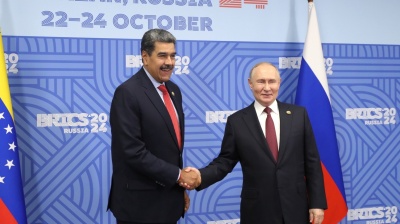Cuba on January 15 began releasing prisoners under a deal with outgoing US President Joe Biden's administration to remove the communist island from a list of terror sponsors, but Secretary of State-designate Marco Rubio signalled the policy shift would be short-lived.
Three prisoners from a promised group of 553 were freed by the morning, according to family members and a monitoring group.
The releases include individuals detained during the July 2021 protests, when hundreds of Cubans took to the streets over power outages and food shortages in the largest demonstrations since the 1990s.
Foreign Minister Bruno Rodríguez Parrilla welcomed the decision, but called it “limited and late.” He told reporters that Cuba's previous inclusion on the terrorism list "lacked credibility" but had "extraordinary" negative effects on the Cuban population, suggesting that Biden's decision reflected the failure of US strategy towards Cuba.
"The ultimate goal of defeating the Revolution has failed," Rodríguez said, arguing that US measures were designed to cause economic and social collapse in the Caribbean nation. He described such policies as "obsolete" and lacking support among both Americans and US-based Cubans.
Cuban President Miguel Diaz-Canel had earlier sent a letter to Pope Francis announcing the decision to free the prisoners. While the Foreign Ministry said releases would be conducted "based on a careful analysis" of each case, it did not specify which prisoners would be freed or provide an exact timeline.
The Catholic Church has historically played a key role in Cuban prisoner releases. During Pope John Paul II's 1998 visit, Fidel Castro freed 200 prisoners. In 2003, 75 detained dissidents were released after Vatican talks, while thousands were freed before Pope Benedict XVI's 2011 visit and Pope Francis's 2015 trip.
At his Senate confirmation hearing on January 15, Rubio made clear his intention to reverse Biden's decision to remove Cuba from the terrorism blacklist. "There is zero doubt in my mind that they meet all the qualifications for being a state sponsor of terrorism," said Rubio, the son of Cuban immigrants opposed to Fidel Castro's 1959 revolution.
Rubio cited Cuba's support for Colombian guerrilla group FARC, Venezuelan President Maduro and alleged ties to militant groups Hamas and Hezbollah. He also claimed Cuba hosts espionage stations for two countries "90 miles from the shores of the United States."
The prisoner release agreement, negotiated with help from the Vatican, follows Biden's decision on January 14 to remove Cuba from the US list of state sponsors of terrorism, a designation imposed by then-president Donald Trump in January 2021 during his final days in office. At that time, Trump's Secretary of State Mike Pompeo had cited Cuba's refusal to extradite members of Colombia's ELN rebel group, though Colombia has since dropped those arrest warrants under leftist President Gustavo Petro.
"The news of the announced gradual release of over 500 Cuban prisoners is a sign of great hope at the beginning of this Jubilee," Cardinal Pietro Parolin, the Vatican's Secretary of State, told journalists.
"It is significant that Havana authorities linked this decision directly to Pope Francis' appeal, who, in the Bull of Indiction of the Jubilee, and then on several other occasions, called for acts of clemency, as has often occurred during the Holy Year."
The incoming Trump administration has already signalled its intent to reverse course. Representative Mike Waltz, Trump's pick for national security adviser, told Fox News that while they didn't oppose the prisoner releases, the broader policy changes would likely be reversed.
The Cuban foreign ministry acknowledged the US decision as moving "in the right direction" while condemning ongoing sanctions as "economic warfare." The ministry said it would remain "ready to develop a respectful relation with that country, based on dialogue and non-interference in the internal affairs of both countries, despite the differences."
The agreement has won praise from Latin American leaders. Colombian President Gustavo Petro called it "great progress" on social media, while Bolivian President Luis Arce described it as "an important step" toward ending the decades-long US economic embargo.
Mexican President Claudia Sheinbaum echoed these sentiments, stating during a press briefing "We are very pleased that President Biden has withdrawn this issue that Cuba was a country that supported terrorism, it is very good that this happened and it is good that Biden did it."
Senior US administration officials said a review found "no credible evidence" that Cuba was currently supporting international terrorism. The moves by Biden effectively roll back several Trump-era sanctions, including restrictions on financial transactions with Cuban military and government entities and a 2017 memorandum that had toughened Washington’s policy toward the island.
Cuba faces severe economic challenges, with recurring shortages of food, fuel, medicine and electricity driving a record exodus. At least 1mn Cubans have left the island since 2020, many heading to the United States.
The current US terror sponsor list includes only Iran, North Korea, and Syria, with the latter’s status likely to be reviewed in the wake of the fall of the Assad regime. Any changes to Cuba's status will be subject to review by Congress and the incoming Trump administration, which takes office on January 20.
News

Russia launches Khabarovsk nuclear submarine designed to deploy nuclear-capable Poseidon drones
Russia has launched a new strategic nuclear submarine, the Khabarovsk, which is capable of carrying a dozen of the Kremlin’s recently unveiled nuclear-powered Poseidon torpedo—a next-generation weapons system that Putin called "unstoppable."

Pashinyan urges end to ‘Soviet KGB worldview’ in Armenian-Azerbaijani relations
In an animated speech, Armenian Prime Minister Nikol Pashinyan called for a fundamental reset in the way Armenians and Azerbaijanis perceive one another, urging both nations to move beyond Cold War-era "KGB" mentalities are stil at play.

APEC meeting closes in South Korea, WTO dead and buried
This was not a summit. It was a eulogy for the WTO, and APEC just lowered the flag to half-mast.

Turkish state grabs another fintech as company seizures continue at pace
Turkey first seizes companies, then tries the suspects. Some companies are sold before the trial process.




